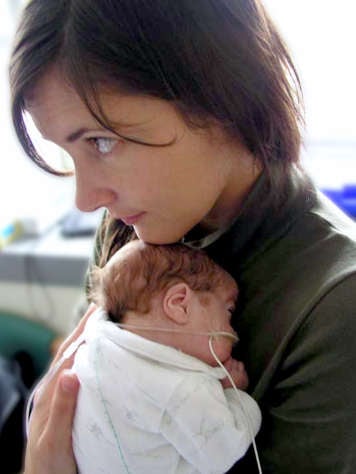How much parents can participate in the care of their baby and interact with them depends on several things, not the least of which is the condition of the baby. In most cases, parents can do more than they imagine.
Being a part of your baby's care

There may be limits on how involved parents can get with their baby’s care because there will probably be constraints on how much time they can spend in the Neonatal Intensive Care Unit (NICU). Additionally, especially at the beginning of a family’s experience in the NICU, parents may not know what they can do. This is understandable; the environment of the NICU is unique and most people have never experienced anything like it.
A little time getting used to the realities of the NICU and their baby, and a little knowledge, generally lets parents ease into a more active role. As parents become more comfortable with the NICU, they should ask what they can do to help. Participating in a baby’s care, even in the smallest ways, encourages bonding between parent and child and is beneficial to the baby’s health. Second, participation will do wonders to combat a sense of helplessness that parents often feel, especially at the beginning, when confronted with a baby needing care at the hospital.
At the same time, parents should not feel badly that they cannot participate in their baby’s care, or even visit the NICU, as much as they would like. Do as much as you can and don’t feel guilty about not being able to do more.
Kangaroo care
Kangaroo care is skin-to-skin touch between a parent and baby. Kangaroo care has been shown to encourage healing, reduce pain and increase bonding between parent and baby.
Breastfeeding
Breastfeeding, when possible, encourages bonding, healing and pain relief in addition to all the excellent nutritional benefits that breast milk provides.
Communicating with friends and family
Often, the role of communicator falls to the parents who end up being the link between the health-care team, the rest of the family and friends. There is a lot of information that is shared by the health-care team, and it is sometimes difficult to remember and summarize it for others. Get a pad of paper and write things down or take notes on your phone. Appoint someone, a friend or family member, to be the communicator to the rest for the family. This will reduce the number of people a parent has to relay information to and free up time for other things.
All parents are encouraged to learn as much as they can about their baby’s condition and about the NICU in general. The more parents know about the situation, the more questions they can ask. The more they can participate, the better communication will be between all concerned.
Learning about paediatric care is not easy. If you are not offered, ask staff to direct you to sources of information that will be understandable. Learn as much as you can and do not feel guilty about the limits of your understanding. No parent is expected to learn so much in a short period of time. It took years of training for staff members in the NICU to become experts in the care of sick or premature babies.
Visits to the NICU
Although there are usually no limits to parents visiting or calling the NICU, this is not the case for extended family members and friends. These individuals should be told this fact in order to avoid unexpected visits during awkward times and to avoid disappointments when they are not admitted to the NICU. Parents should also try to get a sense of whether and how much they want others to visit. If parents want privacy, they should tell their friends and family directly.
Parents often want to bring their other children into the NICU to visit their new sibling. This is a good idea; it often helps children understand why their parents are suddenly not around so much. Siblings often go through changes when a new, full-term baby arrives at home. This experience can be amplified by a baby in the hospital. If siblings visit the NICU, age-appropriate information should be given to them, so they know what to expect and how to behave. Ask the health-care team for help to decide when siblings should visit and what to tell them. It should be noted that some hospitals may not allow children below a certain age to visit the NICU.
Privacy and other parents
The NICU is a temporary home to several babies and their visiting parents. Often, parents are comforted by meeting other parents, swapping stories and sharing experiences. However, every parent has a right to privacy. These rights must be respected. The health-care team will also inform parents about the specific rules of the NICU that are in place to protect privacy.